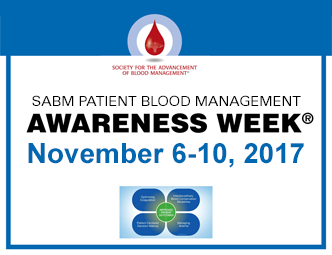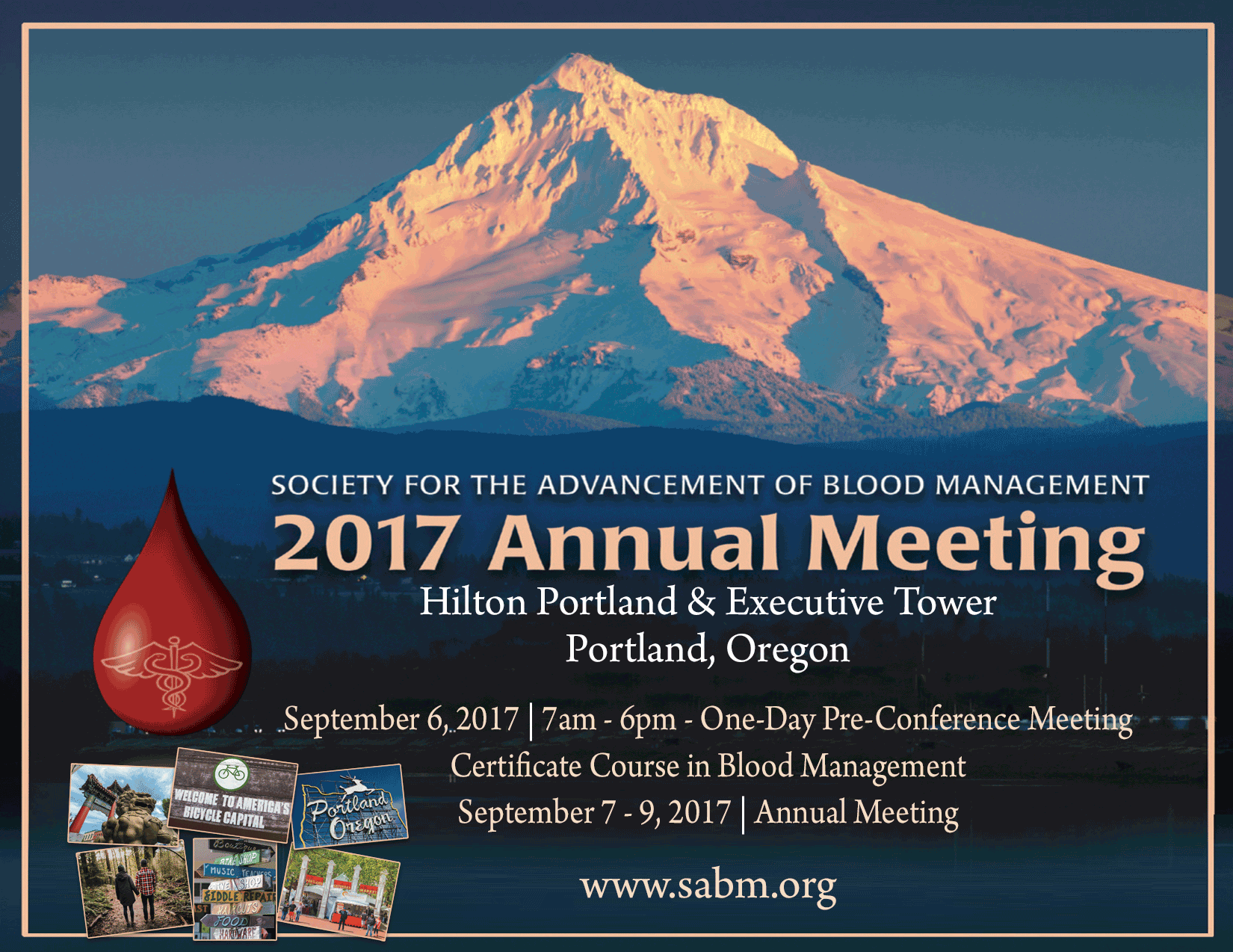SPRING 2017
ISSUE

The Society for the Advancement of Blood Management (SABM)
invites healthcare organizations worldwide to participate in this week dedicated to educating patients and healthcare professionals about patient blood management.
Download SABM's
Patient Blood Management Awareness Week 2017
Poster and Timeline
Please consider making a donation to your Society. Your donations will help us to improve the lives of people throughout the world through Patient Blood Management.

SABM 2017 Newsletter Publication Schedule
February | May | August | November
Editor
Carolyn Burns, MD
Associate Editor
Tiffany Hall, RN
Contributors
Arthur Bracey, MD
James Brown, MHA, CCP
Carolyn Burns, MD
Elizabeth Dackiw, RN
Nabil Hassan, MD
Tiffany Hall, RN
Becky Rock, RN
Kevin Wright
Meredith Reyes, MD
Ananthi Krishnamoorthy
Executive Director
Sherri Ozawa, RN
SABM Officers and
Directors
|
|
Featured Affiliate: St. Luke's Medical Center
At Baylor St. Luke's Medical Center, home of Texas Heart® Institute, we are proud to work in the institution created by a pioneer in heart surgery and blood conservation, Dr. Denton Cooley, recipient of the 2002 SABM President’s Award. Dr. Cooley performed many “firsts” in cardiovascular surgery including the first human heart transplant in the United States, the world’s first human implantation of an artificial heart, and the routine adaptation of hemodilution for cardiopulmonary bypass. It was natural that our blood conservation efforts began with our cardiovascular surgery team to continue Dr. Cooley’s legacy of blood conservation.
We have a multi-disciplinary Cardiovascular Surgery Patient Blood Management Committee that regularly meets to promote best practice and track patient outcomes. An early target for blood conservation was customization of cardiopulmonary bypass circuit size for each patient to limit the adverse impact of hemodilution on hemostasis. We reduced circuit size resulting in an obligatory crystalloid load of 2200 ml of priming volume to 840 ml to ml depending on weight. This decrease in hemodilution is known to decrease bleeding and transfusion risk. We continue collaboration with our perfusionist team to further enhance application of weight-based CPB microcircuits as we plan for even smaller circuits. Retrograde autologous prime (RAP) is another strategy introduced by Dr. Rosengart – Dr. Cooley’s successor. It is currently performed in about 30% of all patients with a volume of 200-400 ml blood per case pumped out of the circuit to eliminate crystalloid. Our goal is to increase adoption by an additional 30% of cases over the next 6 months so that this technique is employed in the majority of eligible patients. To ensure that intra-operative RBC transfusions meet current guidelines, all intraoperative transfusions are reviewed for nadir intraoperative hemoglobin levels and associated clinical events by the Chief of CV Anesthesia. The review plan includes forwarding all events that fall outside of transfusion guidelines to the Cardiovascular Surgery Chief of Service.
A near-site laboratory transmits whole blood viscoelastic coagulation results onto the anesthesia module to allow real-time coagulation monitoring, permitting CV anesthesia staff to follow a jointly developed transfusion algorithm guiding blood product (platelet /plasma/CRYO) and hemostatic drug therapy . Blood units are matched to the recipient with the scanning capability of rapid transfusion systems to ensure the safety of all transfusions, including those with massive transfusion requirements. In the post-operative setting – a fluid replacement algorithm based on a mixture of clinical and laboratory parameters is applied by the intensivist team monitoring post-operative patients.
As more potent antiplatelet therapy has gained a foothold in the armamentarium of cardiology care, managing patients on these agents has grown in importance. We are unique in providing light transmittance aggregometry utilizing “weak” dose (2 x 10-6M)ADP 24 hours – 7days/week. We defined the use of this test for assessment of platelet function in patients treated with P2Y12 inhibitors. We routinely apply platelet function testing to assess for drug resistance and/or residual effect in the pre-operative assessment of surgical patients. This availability allows patient-specific determination of when it is safe to proceed to surgery without having to rely on a generalized interval of drug effect. Additionally, the test is available to guide transfusion decisions when despite a normal platelet count, platelet dysfunction with associated bleeding risk can be demonstrated.
Another unique feature of our institution is the Clinical Pathology Consult team. Born in the early days of Left Ventricular Assist Device implantation and Heart Transplantation, this originated as a means for managing large volume blood loss in coagulopathic patients. Our team of Clinical Pathologists, with specialty training in transfusion medicine and coagulation is on call 24/7 for guidance and management of hemotherapy. Whether it is for a patient who is bleeding intraoperatively, or a patient is anticoagulated and needs urgent surgery, our service is part of patient management team . We order optimal laboratory testing and ensure their timely completion. Our involvement allows the rest of the team to focus on their respective areas of patient care while we ensure that the patient receives only the blood components or pharmacologic therapies necessary to treat their bleeding or coagulopathy. This approach in cardiovascular surgery was so popular that it quickly branched out into other areas of the hospital. We can now help manage most bleeding or coagulopathic patients in our hospital, including those with liver disease, gastrointestinal bleeds, and intracranial bleeds. While this approach may not work for many hospitals, we have established a solid niche in patient care and blood management and cherish that role.
Contributor: Dr. Meredith Reyes
|
|
PBM for Patient Blood Management Section

Save the Date for SABM's Annual Meeting
September 6 – 9, 2017
Hilton & Executive Tower
Portland, Oregon
PBM Certificate Course
September 6, 2017
7:00am – 6:00pm
Annual Meeting
September 7 – 9, 2017
Members Invited to Submit Papers CLICK HERE
Join SABM's Call to Action for Medicare to Expand Coverage for Treatment of Anemia!
Click HERE for detailed information about what you can do to get involved.
©2017 Society for the Advancement of Blood Management
350 Engle Street
Englewood, NJ 07631
Phone: (928) 551-6400
Fax: (877) 944-2272
EMAIL: [email protected]
|